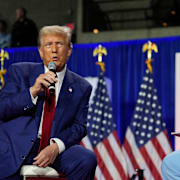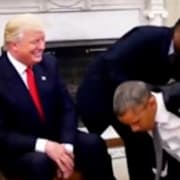
Vita huset blockerar ett utlämnande av utredningen
Vita huset avvisar kongressens krav på att den särskilde åklagaren Robert Muellers Rysslandsutredning ska släppas i sin helhet, skriver Washington Post.
Detta efter att president Donald Trump utfärdat en sorts order ”executive privilege” som innebär att han själv kan avgöra vad som ska släppas till kongressen och inte.
– Varken Vita huset eller justitieminister (William) Barr kommer att gå med på ordförande (Jerry) Nadlers olagliga och hänsynslösa krav, säger Vita husets presstalesperson Sarah Huckabee Sanders enligt AFP.
I och med beslutet trappas konflikten med demokraterna upp. Demokraterna har sedan justitieminister William Barr offentliggjorde delar av utredningen krävt att den ska offentliggöras i sin helhet.
bakgrund
Executive privilege
Wikipedia (en)
Executive privilege is the power of the President of the United States and other members of the executive branch of the United States Government to resist certain subpoenas and other interventions by the legislative and judicial branches of government in pursuit of information or personnel relating to the executive. The power of Congress or the federal courts to obtain such information is not mentioned explicitly in the United States Constitution, nor is there any explicit mention in the Constitution of an executive privilege to resist such requests from Congress or courts. The Supreme Court of the United States has ruled this privilege may qualify as an element of the separation of powers doctrine, derived from the supremacy of the executive branch in its own area of Constitutional activity.The Supreme Court confirmed the legitimacy of this doctrine in United States v. Nixon in the context of a subpoena emanating from the judiciary, instead of emanating from Congress. The Court held that there is a qualified privilege, which once invoked, creates a presumption of privilege, and the party seeking the documents must then make a "sufficient showing" that the "Presidential material" is "essential to the justice of the case". Chief Justice Warren Burger further stated that executive privilege would most effectively apply when the oversight of the executive would impair that branch's national security concerns. Regarding requests from Congress (instead of from the courts) for executive branch information, as of a 2014 study by the Congressional Research Service, only two federal court cases had addressed the merits of executive privilege in such a context, and neither of those cases reached the Supreme Court.In addition to which branch of government is requesting the information, another characteristic of executive privilege is whether it involves a "presidential communications privilege" or instead a "deliberative process privilege" or some other type of privilege. The deliberative process privilege is often considered to be rooted in common law, whereas the presidential communications privilege is often considered to be rooted in separation of powers, thus making the deliberative process privilege less difficult to overcome. Generally speaking, presidents, congresses and courts have historically tended to sidestep open confrontations through compromise and mutual deference in view of previous practice and precedents regarding the exercise of executive privilege.
Omni är politiskt obundna och oberoende. Vi strävar efter att ge fler perspektiv på nyheterna. Har du frågor eller synpunkter kring vår rapportering? Kontakta redaktionen



